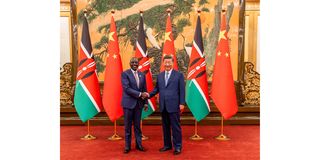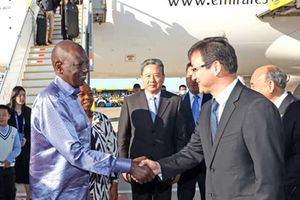
President William Ruto meets his China counterpart Xi Jinping at the Great Hall of the People in Beijing, China.
Kenya’s President William Ruto flew out to Beijing this week for the Forum on China-Africa Cooperation (Focac), the triennial event the Asian country is holding for the ninth time.
From the outset, this visit, compared with last year’s when he attended the Belt and Road Forum, looked like it had better prospects.
An official line from the Chinese dispatch said, “China and Kenya will sign a number of bilateral cooperation documents in financing, infrastructure and other fields.” Of all the things about trips to China, this line is the often the determinant of whether a trip is successful.
Ahead of this trip, Kenya had its wish list in extending the standard gauge railway from Naivasha to Malaba, widening the Rironi-Malaba highway, various road upgrades, technical training support, data centre, green projects and a dam.
Yet the language of the Chinese is an indirect jab: “The two sides should enhance communication and coordination on international and regional issues, work together to safeguard the common interests of the Global South, and promote regional peace and stability.”
In October last year, they said a similar thing: “The two sides also need to strengthen communication and collaboration in multilateral settings to practice true multilateralism and safeguard the common interests of developing countries.”
President Ruto arrived in Beijing last year against the backdrop of a strong messaging against the Chinese and their debt story. The Kenyan leader had campaigned against borrowing, promised to gradually cut down public debt and said Kenyans should mostly finance their development, through taxes.
He looked more Western-leaning, making most trips to Western countries and their allies such as Japan and South Korea, and earned a state visit to the US this year.
Then the Chinese slowed their hand in lending Kenya and Japan, and the World Bank and International Monetary Fund became the go-to people.
In Beijing last year, Dr Ruto spoke of a railway linking the Indian Ocean to the Atlantic, spoke of inviting private sector to these shores and reiterated the One-China policy.
But the Chinese were still not convinced.
This time round, he has recited the same projects and spoke of a “mutually beneficial relationship.”
Dr Adhere Cavince, a scholar of international relations who analyses China-Africa relations, told The EastAfrican that the Kenyan president’s tone indicates “that he is slowly waking up to the reality of China’s potential role in Kenya’s development.”
“He is hopeful to get some deals into AIIB (China-led Asian Infrastructure Investment Bank), meeting leading Chinese companies and acknowledging conclusion of recent projects,” he said.
Dr Ruto acknowledged some of the projects built by the Chinese – and blamed for debt rise – but which he said had helped “make Kenya a key transport hub not just in Eastern Africa but the continent.” They include the Mombasa-Naivasha SGR, the Nairobi Expressway and other roads in the counties.
The Chinese, however, wouldn’t be drawn into the geopolitical tussles. In 2023, Xi told his guest China would approach its relationship with Kenya from a strategic and long-term perspective. But it was up to Kenya to pursue its independent path to modernisation in “line with the country's actual situation.”
Beijing, he said then, would provide its experience, “but never impose.”
What the Chinese didn’t say publicly was that they would also not allow an imposition of views from outside, nor accept to work with those who criticise their offers.
On Tuesday, the tone was different, but the message was the same. Kenya and China have faced similar problems, President Xi said: Poverty, liberation struggle and journey to modernisation.
He suggested that the two sides pursue the three goals of being “sincere partners of mutual trust,” protecting each other’s sovereignty, supporting each other’s goals, refocusing on the Belt and Road Initiative and upholding fairness and justice.
Is this Beijing’s diplospeak for “no double-dealing”?





